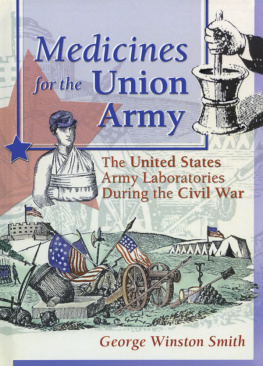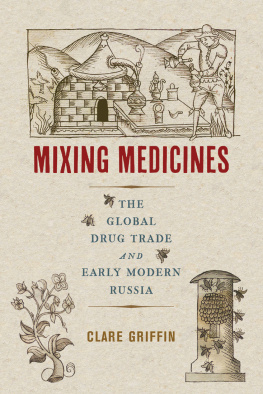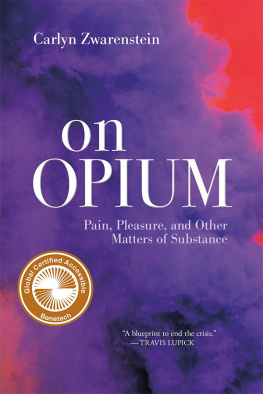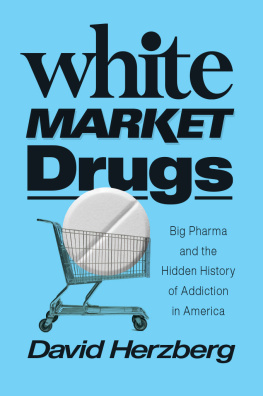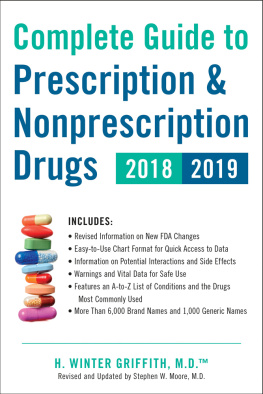Copyright 2017 by Donald R. Kirsch and Ogi Ogas
All rights reserved. No part of this book may be reproduced in any manner without the express written consent of the publisher, except in the case of brief excerpts in critical reviews or articles. All inquiries should be addressed to Arcade Publishing, 307 West 36th Street, 11th Floor, New York, NY 10018.
First Edition
Arcade Publishing books may be purchased in bulk at special discounts for sales promotion, corporate gifts, fund-raising, or educational purposes. Special editions can also be created to specifications. For details, contact the Special Sales Department, Arcade Publishing, 307 West 36th Street, 11th Floor, New York, NY 10018 or .
Arcade Publishing is a registered trademark of Skyhorse Publishing, Inc., a Delaware corporation.
Visit our website at www.arcadepub.com.
Visit the authors site at www.TheDrugHunters.com.
10 9 8 7 6 5 4 3 2 1
Library of Congress Cataloging-in-Publication Data
Names: Kirsch, Donald R., 1950 author. | Ogas, Ogi, author.
Title: The drug hunters : the improbable quest to discover new medicines / Donald R. Kirsch, PhD and Ogi Ogas, PhD.
Description: First edition. | New York : Arcade Publishing, [2017]
Identifiers: LCCN 2016034624 | ISBN 9781628727180 (hardback) | ISBN 9781628727197 (ebook)
Subjects: LCSH: DrugsResearchHistory. | PharmacologyHistory. | BISAC: SCIENCE / History. | MEDICAL / Pharmacology. | MEDICAL / History. | BIOGRAPHY & AUTOBIOGRAPHY / Medical.
Classification: LCC RM301.25 .K57 2017 | DDC 615.1072dc23 LC record available at https://lccn.loc.gov/2016034624
Cover photo: Slobodan Cedic
Printed in the United States of America
Contents
The Unlikely Origins of Drug Hunting
The Library of Botanical Medicine
The Library of Industrial Medicine
The Library of Synthetic Medicine
We Figure Out How Drugs Actually Work
The Tragic Birth of Drug Regulation
Pharmacology Becomes a Science
The Library of Dirty Medicine
The Library of Genetic Medicine
The Library of Epidemiological Medicine
Drug Hunters Striking Gold Outside of Big Pharma
Discovering Drugs Through Blind Luck
The Chevy Volt and the Lone Ranger
Classes of Drugs
Introduction Searching the Library of Babel |

The Library of Babel
By this art you may contemplate the variations of the 23 letters.
Jorge Luis Borges, The Library of Babel
I n the deep mists of prehistory, everybody was a drug hunter. Our parasite-infested, malady-ridden ancestors chewed every new root and leaf they chanced upon, hoping to unleash some fortuitous benefit that might ameliorate their afflictionsand praying they did not perish from their blind experimentation. Through sheer serendipity, some fortunate Neolithic souls stumbled upon substances with medicinal properties, including opium, alcohol, snakeroot, juniper, frankincense, cumin, andapparentlybirch fungus.
Sometime around the year 3300 BC, a solitary man, cold, ill, and mortally wounded, struggled through the high peaks of the tztal Alps in Italy until he collapsed in a crevasse. Here he lay frozen for more than five thousand years until hikers stumbled upon his ice-mummified corpse in 1991. They dubbed him tzi. When Austrian scientists thawed out this Ice Age hunter, they discovered his intestines had been infested with whipworms. At first the researchers remarked that tzi and his contemporaries most likely suffered the indignities of this painful parasite without any hope for relief. A second discovery prompted them to revise their convictions.
Attached to tzis bearskin leggings were two hide strips, each knotted around a rubbery white lump. These strange bulbs turned out to be fruiting bodies of the birch polypore, a fungus with antibiotic and anti-hemorrhaging properties. It also contains oils that are toxic to whipworms. tzis hide-knotted mushrooms are quite likely the oldest medicine kit ever found. The Icemans medicines did not have high potency or efficacybut they worked. The existence of a five-thousand-year-old anti-worm drug (what pharmacologists would call an antihelminthic) reminds me of something my PhD advisor used to say: When you see a dog walking on its hind legs, you are not impressed by his grace or agility but rather by the fact he can do it at all.
tzis remarkable birch fungus embodies a simple truth about humankinds quest for medicine. This Neolithic remedy did not arise from clever innovation or rational inquiry. No Stone Age Steve Jobs engineered this antihelminthic out of the visionary workings of his mind. No, tzis drug was the product of sheer unadulterated luck. All prescientific drug hunting advanced through simple trial and error.
And today? As Pfizer, Novartis, Merck, and other Big Pharma conglomerates spend billions of dollars on state-of-the-art drug hunting laboratories, you might guess that most blockbuster drugs are the fruits of meticulously planned drug engineering projects where the role of trial-and-error has been replaced with informed scientific execution. Not so. Despite the best efforts of Big Pharma, the prime technique of the twenty-first-century quest for medicine remains the same as it was five millennia past: painstakingly sampling a mindboggling variety of compounds and hoping that one of them, just one , proves out.
Over the course of my nearly four-decade career as a drug hunter, Ive learned firsthand that new medicines are often discovered by routes that are wildly circuitous or entirely fortuitousor both. The professional drug hunter is kin to the professional poker player: possessing enough knowledge and skill to tilt the game in his favor at crucial moments but always at the mercy of the shuffle of the cards.
Consider rapamycin. In the 1970s, biologist Suren Sehgal was working for Ayerst Pharmaceuticals looking for a new drug to treat common fungal infections such as Candida vaginitis and athletes foot. After sampling tens of thousands of compounds, Sehgal discovered a novel antifungal compound that originated in a soil microorganism found on Easter Island. He named the drug rapamycin after Rapa Nui, the aboriginal name for the remote Pacific island.
Sehgal tested rapamycin on animals and found that it wiped out any malevolent fungi. Unfortunately, the drug also suppressed the animals immune system. If you are trying to eliminate an infection, especially a fungal infection, it is crucial for the immune system to work effectively and in concert with an antifungal medicine. This unfortunate side effect proved to be insurmountable, and the Ayerst executives decided to ditch rapamycin and move on.
But Sehgal did not want to give up. He knew that another antifungal compound, cyclosporine, was being developed for a very different useas an organ transplant therapy. Like the Easter Island drug, cyclosporine also produced immunosuppressive effects, but this was a desirable property for a post-transplant drug because it helps prevent the body from rejecting the new organ. Sehgal reasoned that rapamycin might also be useful as an anti-rejection therapy.


